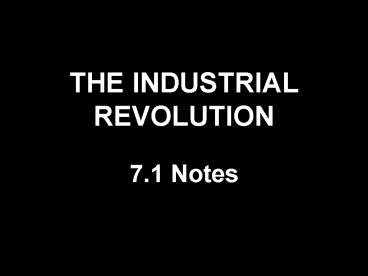THE INDUSTRIAL REVOLUTION - PowerPoint PPT Presentation
1 / 11
Title:
THE INDUSTRIAL REVOLUTION
Description:
THE INDUSTRIAL REVOLUTION 7.1 Notes What is a Revolution? Britain s Unique Advantages to Industrialization Escaped direct damages from wars in Europe from 1688-1815 ... – PowerPoint PPT presentation
Number of Views:85
Avg rating:3.0/5.0
Title: THE INDUSTRIAL REVOLUTION
1
THE INDUSTRIAL REVOLUTION
- 7.1 Notes
2
- What is a Revolution?
3
Britains Unique Advantages to Industrialization
- Escaped direct damages from wars in Europe from
1688-1815 - The union of England and Scotland in 1707 formed
a single economic unit - Abundant amount of natural resources
- Disappearance of serfdom meant that the surplus
of labor released by rising agricultural
productivity could now move to growing industrial
centers - England had a unique network of canals and
rivers, to move raw materials and finished goods
4
Agricultural Revolution 1700-1800
- Jethro Tull, 1674-1741
- First Modern Farmer
- Invented seed drill
5
Ag. Rev. Cont.
- Enclosure Movement
- Law passed by parliament in the 1700s where
landowners fenced off common lands, causing
peasants to move into towns. - Crop Rotation
- produced more crops using same amount of land
- Allowed Britain to have a plentiful supply of
labor in urban area.
6
Energy Revolution
- Coal used to power steam engines
- James Watt (1769) pump to get water out of mines
- Rail lines (1780)
- Crossed Britain, Europe, N. America
- Improved trade
- Encouraged travel
7
Textile Industry
- Flying shuttle, Spinning jenny, Water frame,
Spinning mule, Power loom, Cotton Gin - 1785
- 40 million yards
- 1850
- 2 billion yards
8
Hazards of Life
- Long hours
- Low pay
- Safety issues
- Pollution
- Overcrowded living condition
- Children labor
9
The Bourgeois
- Because of the industrial revolution a new middle
class was formed - Merchants, industrialists, professionals, and
entrepreneurs
10
Capitalism vs. Socialism
- Capitalism
- Individuals control factors of
production - Land, labor, capital, business privately owned
- Socialism
- Government controls all means of production
- Operated for the people
11
Socialism
- Karl Marx
- believed that the capitalistic system was
destructive - Believed socialism and communism was the answer
- Public ownership of production would allow the
wealth to be distributed more equitably to
everyone.































